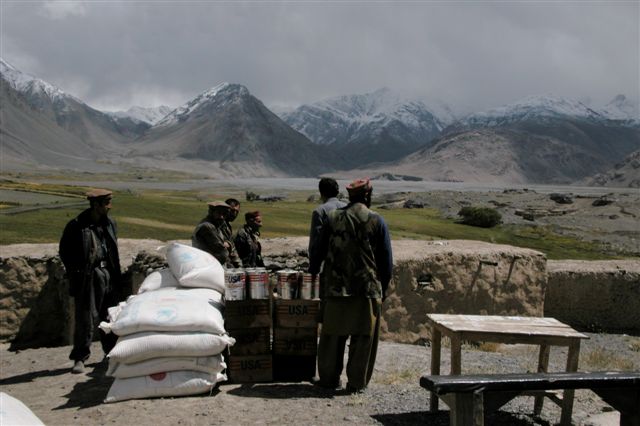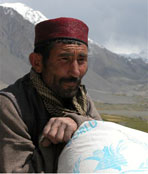|
Providing food aid to needy Afghans is a constant battle against the elements; after months of struggling through the snow, WFP has started urgent distributions to those affected by floods.
Despite the adverse weather conditions, WFP’s school feeding programme reaches children in the remotest corners of Afghanistan.
Last September, just before snow made the region inaccessible until April, WFP public information officer Maarten Roest witnessed the distribution of winter supplies in Potokh, at “the end of the world”.
Potokh, September -
After travelling for three days we enter a vast, almost circular plain, enclosed on all sides by spectacular mountains.
Ahead, to the east, lies China. To the south is Pakistan, and to the north rises the Pamir , one of the world’s highest plateaus. Finally, we have reached Potokh.
Accompanied by a Reuters television crew, we have come all this way to witness the distribution of food under WFP’s school feeding programme. The cameraman is enjoying it and understandably so: there’s sheer visual delight on offer.
DEEP BLUE SKY
 The school is a mud-brick compound sitting on a gentle hill which dominates the valley’s green slopes, themselves walled in by barren mountains capped with snow. Above them, clouds move fast across a deep blue sky. The school is a mud-brick compound sitting on a gentle hill which dominates the valley’s green slopes, themselves walled in by barren mountains capped with snow. Above them, clouds move fast across a deep blue sky.
The schoolchildren have lined up neatly and, one by one, proceed to collect their entitlements. There’s wheat for all, and cooking oil for the girls – an extra incentive to encourage their attendance.
WILD RIVERS, BUMPY ROADS
Our journey to Potokh began in Fayz Abad, the capital of Afghanistan ’s north-eastern Badakshan province.
A day’s drive along bumpy roads following wild, turquoise rivers brought us to Iskashim, a border town with Tajikistan and gateway to the Wakhan region.
Our guide Nasr, a national WFP officer from Fayz Abad, talked to us about Wakhan, the narrow corridor of land that links Afghanistan to China.
WOLVES AND ISOLATION
He told us about the isolation, and how, for a Wakhi, going to Fayz Abad could easily mean a twelve-day wa lk. lk.
He told us about the altitude. Afghanistan ’s highest peak, the 7,485-metre Nowshak, was facing us.
He told us how, in winter, hungry wolves prevent people from leaving their houses, and going to school is far too dangerous.
He also told us about the near absence of money. Here, people barter: a cow for a goat, rice for a sheep.
EAST ALONG THE AMU DARYA
The following day we drove east along the banks of the great Amu Darya, a river once known as the Oxus that formed the eastern boundary of the empire of Alexander the Great.
This 250-kilometre stretch of road between Iskashim and Potokh had been rebuilt under WFP Food for Work programmes, said Nasr, as had most of the culverts and some of the bridges.
SOVIET OCCUPATION
 During the Soviet occupation, the roads were used for the transit of tanks, he added. In those days he had joined the ranks of the Afghan resistance, the mujahiddeen. During the Soviet occupation, the roads were used for the transit of tanks, he added. In those days he had joined the ranks of the Afghan resistance, the mujahiddeen.
Pointing to the south, Nasr told us about a failed mujahiddeen incursion that he had been part of: after spending 11 days in mountains as high as 6,000 metres, they gave up. Nasr had lost many comrades and a handful of fingers.
“The Afghan people have made many sacrifices for their country,” he said.
CLOSER TO THE SNOW
The snow seemed to be coming closer as we continued. In reality we were moving closer to the snow, rising above 3,000 metres as we stopped to visit a school caught between bare mountains, through which glaciers pushed their way down into a narrow valley.
The school was for children from the village of Shasp , but there wasn’t a house to be seen. The kids, we were told, had to walk at least an hour to get to school.
I asked a villager if he had ever been to Fayz Abad. No, he said. Ishkashim? No. Not there either. “We live here,” he said.
THE END OF THE WORLD
Potokh is also known as Sarhad, the Persian for border, Nasr said as we entered the green plain surrounding the village.
This, he explained, was the end. No road goes further. China , though less then 100 kilometres away, is a full four-day walk from Potokh. “This is akhir-e-dunya,” he added with drama; “The end of the world!”
OIL AND WHEAT
 The line of schoolchildren has grown shorter and shorter. When the distribution is over, we accompany one of them home. The line of schoolchildren has grown shorter and shorter. When the distribution is over, we accompany one of them home.
Beghim, an eleven-year-old girl, carries a can of oil, while her father has loaded a 50 kg bag of wheat onto a donkey.
At home Beghim’s mother, Nur Jihan, says that soon snow will cover the plain, confining the family to their house for six months.
STORES FOR THE WINTER
She is very happy with the food from WFP, as the family will have to live off their stores, and the extra food will be a great help in carrying them through the winter.
She is particularly pleased, she says, because it is linked to the education of their children.
Khazi Mohammad, Beghim’s father, smiles. “It is a gift from Allah!” he says.
|